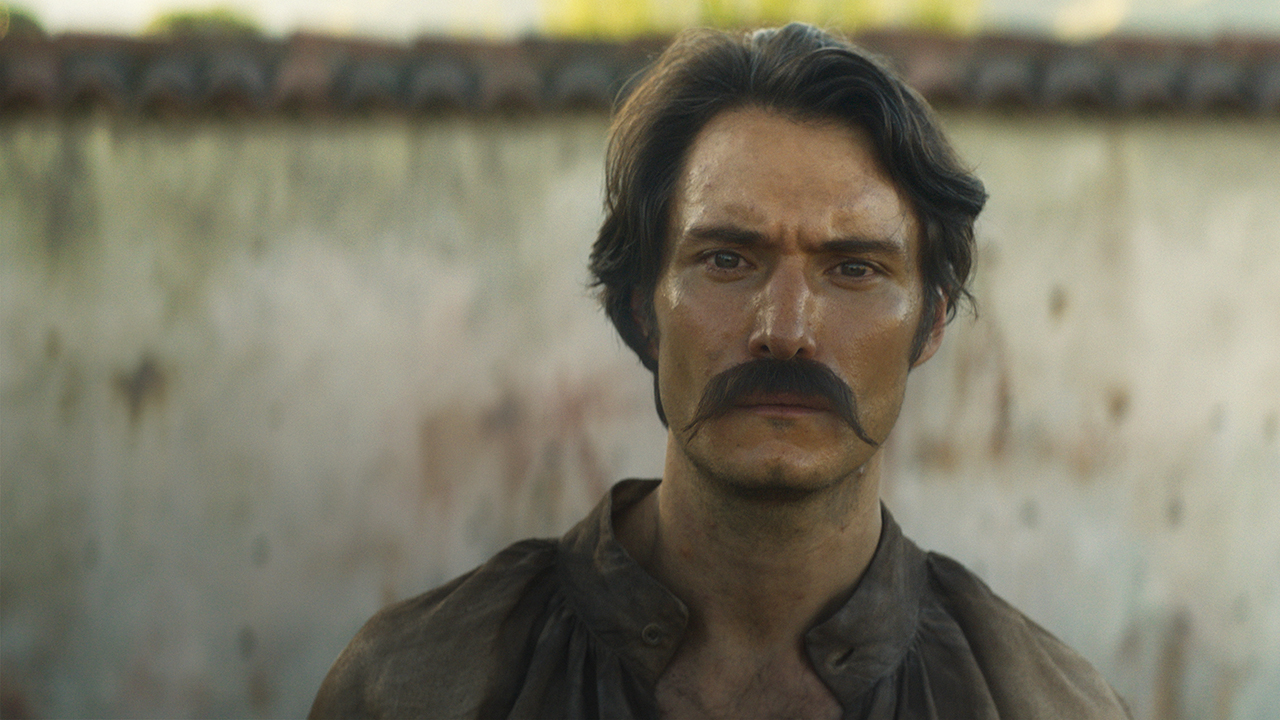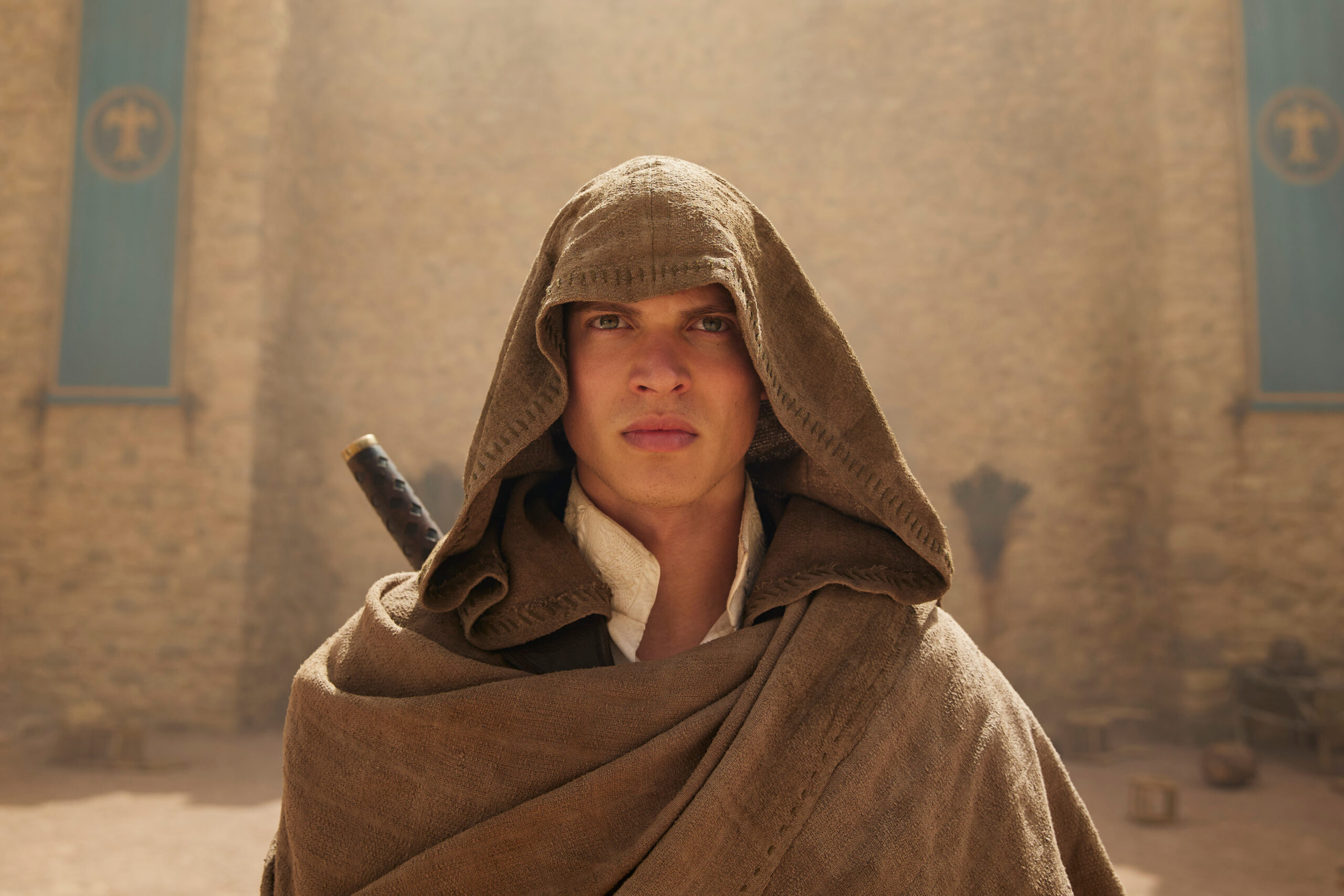![]()
Opening this Friday, April 8 is one of the more innovative action films you’re likely to see anytime soon when HARDCORE HENRY opens nationwide.
It’s the directorial debut by Ilya Naishuller, a Russian punk rocker-turned-filmmaker who caught the eye of Russia’s most successful filmmaker Timur Bekmambetov (WANTED) with the music video for his band Biting Elbows, and the two of them set out to create something similar for the big screen. (You can watch Ilya’s original video here, but WARNING: it’s not really safe for work or for young kids.)
The Hardcore Henry of the title is a man who died but was brought back to life by his wife (Haley Bennett), who is then promptly kidnapped by a powerful warlord named Akan (Danila Kozlovsky) who sends his army of mercenaries to stop Henry from getting her back. Then there’s the mysterious Jimmy (Sharlto Copley) who may be there to help Henry or may just be another obstacle he has to get through to get his wife back.
What makes the movie unique is that it was all shot using small POV cameras (similar to GoPros) to create a movie much like a first person shooter game with action that’s just as frenetic as those games.
Besides having directed WANTED and ABRAHAM LINCOLN: VAMPIRE HUNTER, Bekmambetov has become Russia’s answer to Steven Spielberg with his groundbreaking action film NIGHT WATCH and its sequel, but also producing movies like last year’s horror hit UNFRIENDED.
Latino Review had a chance to talk with Bekmambetov about the process of making Hardcore Henry and helping Ilya realize his vision. He also talked about his next feature as director, a new version of BEN-HUR, which he’s currently finishing up for its August release and also teased some of the other projects he’s working on that follow similar ideas as UNFRIENDED.
![]()
Latino Review: I know a little about Ilya and the fact he was in a punkband and made a video for their song “Motherf*cker†using some of the same techniques, but did you already know him? How did you come on board to produce “Hardcore Henry�
Timur Bekmambetov: No, it happened because of the internet. I found this video because it popped onto my list of trending videos and in three minutes, I already spoke with Ilya on Skype. I just called him and we spoke for 3 to 5 minutes. Because we’re both from Moscow, it was very clear and it took me another 3 minutes of conversation to understand that I’m dealing with a smart and very relatable filmmaker for me. The first idea just flashed in my head was how great that would be on the big screen. It’s very provocative. It’s kind of organic for the computer screen as a YouTube video, but it’s so interesting when it’s changing the perspective. Suddenly, you’re this experimental and unique computer game-looking video and then on the big screen, it has a totally different connotation.
It was at the time when I was in the middle of production on “Unfriended,†this movie we released last year when the whole movie takes place on a computer screening. It was another experiment, another type of innovative cinema. I had exactly the same motivation. I asked Ilya, “Let’s make a movie for big screen, for IMAX,†then at first he said he wasn’t sure it would work, and I said, “Okay, let’s talk tomorrow.†Next day we spoke and I asked him if he wanted to see this kind of movie on the big screen, and he said, “Yes†so I said, “Let’s do it and I’ll help you as much as I can.†Then it was three years of the experiment and the process of developing this new language.
LR: Did he have any sort of idea or script for the movie already or is that something that developed over those years?
Bekmambetov: No, before we began, Ilya came out with a story, and it’s the story we have now. Of course, during this production process, it transformed because Sharlto Copley, he brought ideas and Ilya wrote specific details for the scenes, but from the beginning, it was clear it was going to be a story about a character who is trying to save his wife and his creator.
LR: Obviously you’ve done a lot of crazy visuals on-screen and with action, but when you first saw the video, were you curious about how he did some of it and try to tap his brain about that?
Bekmambetov: It’s crazy, but at the same time it’s very pragmatic. You can do crazy stuff if it’s only three minutes but if it’s 100 minutes, it should be very pragmatic and well planned. For me, this style is very relatable, because the movies I’ve made as a director had this mischievous quality. “Wanted†and “Night Watch†are very different movies but they had a mischievous tone I like. It was I expected from Ilya, this tone and this visual attraction, but what was a surprise for me at the end of the day, it’s not just a circus. It’s a great emotional story with an unpredictable twist and with interesting characters, like all the Sharlto Copley characters.
![]()
LR: Sharlto was a filmmaker in South Africa as well, but he’s been acting more but I guess he still has the bug to be able to contribute to the movie.
Bekmambetov: Yeah, he was a creative partner. He was not a mercenary. Can you imagine going to Russia to act in a movie with a director who had never shot a movie and with such an unusual technique? When you have an actor in front of you interacting with the camera. It was very risky and he was brave to step in and of course, he had a lot of great ideas.
LR: Speaking of the camera, was Ilya able to find someone who was a cameraman-slash-stuntman to pull off the moves needed for the camera? Was he doing some of that himself?
Bekmambetov: It was not one person. There was a few people because some scenes were shot by stunt actors, some scenes were shot by camera men, some were Ilya himself, because sometimes they improvised and only the director can improvise with a camera properly. It was different people. What’s important in this language is the camera is playing two different roles. On the one hand, you’re a camera catching events around you and from the other hand, the camera is a character and you understand this character because the camera has very specific reactions. If the camera is suddenly looking up at the sky, maybe he’s thinking about something or the camera is looking down and you’re seeing your broken knee for example, then it’s another story. The camera movement, whether it’s slower or faster or it’s shaky or stable, it’s very specific and it tells you a story, like choreography.
LR: Did you have any computerized camera movements as well?
Bekmambetov: No, everything practical. They just created a special helmet cam rig which is unique, made by Russian mad scientists, young guys, and it set a very simple, but effective magnetic stabilization system because the camera is very controllable and it’s stabilized. It was very important because Ilya spent a few months developing the technique of how to make this movie watchable, because it’s a helmet cam. The truth is that our neck is a really good steadicam. Usually, we’re not shaking our head unless we’re in the middle of the action, plus this magnetic system helps to make it more stable.
![]()
LR: I was always interested in the fact you worked with Roger Corman before you made “Night Watch†and he was able to produce movies relatively inexpensively. As a producer, do you have that same instinct to make movies as cheaply as possible?
Bekmambetov: It’s not about “as cheap as possible.†It’s as creative as possible, but the budget is as important as the script is what I learned from him, because if you can read the budget than you can understand the style and the tone, sometimes more than when you read the script. In the budget, you can find the decisions. “Oh, this is a handheld camera. Okay I’ll understand how he’ll shoot the movie†or that he’s using three cameras in the budget or that he’s spending all this money to build the set. “Okay, I understand that it will be very visually interesting.†What I learned from Roger is that the budget and the decisions you’re making as a producer, if you have limitations, you’re forced to make decisions. You cannot say, “I will shoot as usual and then I’ll figure it out later what the movie will be.†No, you should decide. Either you will use a steadicam in this scene or handheld or you will make everything on a computer screen. It’s not about how to make it cheap. For snobby filmmakers, it looks like “how to make it cheaper,†but if you know him better, you understand that there’s a creative reason why the budgets are limited.
LR: When I speak to filmmakers who write their own material, I wonder how much they think about budget while they’re writing the initial screenplay.
Bekmambetov: Yes, there are some small tips that I learned. If you’re building a set, then you need to use it as much as you can. It’s creative decisions. It’s not just greedy producer but it’s a smart filmmaker. Like Picasso the painter, there was a blue period in his career when he painted all with blue, just because his friend brought him five boxes of the blue paint. It’s not an accident. It just happened that way.
LR: I ask this because you’re finishing up a Ben-Hur movie and the two earlier versions of Ben-Hur were known as big expensive epics, but you’re making a new version in the modern-day with chariot races and such. What made you want to do your own Ben-Hur movie?
Bekmambetov: It’s not because it’s a big epic, it’s because it’s a great story. It’s the most famous story in American literature for almost 200 years, and it was remade many times. There were Broadway shows and three movies, because the story is very emotional and dramatic and tragic. What was important for me is that this story is really very contemporary. We have the same situation. We live in the same world as we lived 2,000 years ago when the world is united and globalized like the Roman empire and there’s a cult of power and selfishness and competition. These are values we’ve shared for the last few hundred years, but today, we understood that we’re on the edge, because it doesn’t work anymore, and it’s like civilization is looking for new ideas. The book itself, not the movie we remember, is not about revenge or the tough guy who kills his brother, the book is about forgiveness and about how they met each other at the end and forgive each other.
LR: So you saw it as an analogy of what’s going on today in some ways?
Bekmambetov: Yes, exactly, because we live in a world which was militarist 2,000 years ago. There was a globalized world which was the Roman Empire, there was rich and poor like today, there was social conflict and conflict between different nationalities and people hated each other and people fought with each other… and then the Roman Empire fell apart. We shouldthink about it, and the movie is a good tool to force us to think.
![]()
LR: Are you finished with that?
Bekmambetov: No, we’re still mixing and finishing some stuff. What’s interesting is that the chariot race, what was unique, was that it was shot for real. It was 90 horses trained and 8 chariots, each chariot representing a different country. There wereSyrians and Egyptians, Greeks, Romans, Judeans, and there were 8 chariots, 4 horses each chariot. The chariots were very specific, because our chariots were much faster than the chariots in the old movies. It’s like the difference between NASCAR cars and old cars like the Cadillac, which were big but quite slow. Our chariots are much smaller and lower and much more aerodynamic and historically-correct, exactly how it was. The chariots from 1959 were not chariots to race, they were chariots for parades.
LR: What is going on with “Unfriended� Are you still trying to do a sequel to that?
Bekmambetov: We’re making three other movies in the same language. It’s not “Unfriended,†it’s different stories. We just finished the movie called “Liked,†it’s a teenage R-rated comedy based on the Cyrano De Bergerac story and it plays like today’s version of that, and we made a movie in Russia called “Wizard of OS.†It’s “OS†like “operational system†and it’s about the young girl who lost her home page and trying to get back home and find her files, so there’s munchkins and scarecrows. It’s everything happening on the internet. We’re producing a Russian reality show where the whole show is happening on computer screens because all the participants are online and you can watch their screens 24 hours a day, what they’re doing. We’re trying to develop this language, too.
LR: At one point you were going to do a Moby Dick movie so is that not happening because of the Ron Howard movie?
Bekmambetov: Yeah, unfortunately it didn’t happen, but who knows? You never know.
HARDCORE HENRY opens nationwide on Friday, April 8, and BEN-HUR is scheduled to open on August 12.

 FOR FANBOYS, BY FANBOYS
Have you checked out LRM Online’s official podcasts and videos on The Genreverse Podcast Network? Available on YouTube and all your favorite podcast apps, This multimedia empire includes The Daily CoG, Breaking Geek Radio: The Podcast, GeekScholars Movie News, Anime-Versal Review Podcast, and our Star Wars dedicated podcast The Cantina. Check it out by listening on all your favorite podcast apps, or watching on YouTube!
Subscribe on: Apple Podcasts | Spotify | SoundCloud | Stitcher | Google Play
FOR FANBOYS, BY FANBOYS
Have you checked out LRM Online’s official podcasts and videos on The Genreverse Podcast Network? Available on YouTube and all your favorite podcast apps, This multimedia empire includes The Daily CoG, Breaking Geek Radio: The Podcast, GeekScholars Movie News, Anime-Versal Review Podcast, and our Star Wars dedicated podcast The Cantina. Check it out by listening on all your favorite podcast apps, or watching on YouTube!
Subscribe on: Apple Podcasts | Spotify | SoundCloud | Stitcher | Google Play



